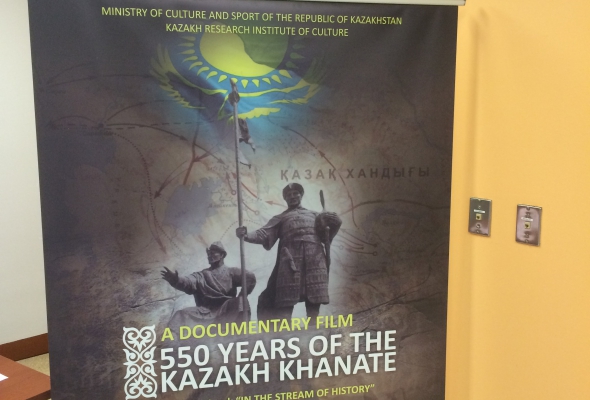Within the celebration of the 550th anniversary of the Kazakh Khanate, the Kazakh Research Institute of Culture with the support of the Embassy of Kazakhstan to the United States held the premiere screening of the two-part documentary film “Dasht-I-Kipchak: Secret Signs” at George Washington University on Aug. 4, according to a Kazakh Ministry of Foreign Affairs press release.
The first part of the film is dedicated to the history of Kipchak language development – ancestor of a significant number of Turkic languages – that was used by all people living on the territory from the Altai Mountains to the Danube River 700 years ago. It was also spoken in Egypt where the Kipchaks ruled for some time headed by Sultan Baybars.
The second part of the film is dedicated to the unique book “Codex Cumanicus” (translated as the Book of the Kipchaks) given by prominent poet of the Age of Renaissance Francesco Petrarca to the Venice library in 1362. Now it is stored in the Saint Mark’s Basilica in Venice. Codex Cumanicus is a famous written source of the Kuman language (ancient Kipchak) of the 16th century that has good materials not only for philologists but for historians as well.
The event, which gathered more than 100 representatives of social, cultural and academic circles, has attracted much interest among the American public.
The film was written and directed by expert of Kazakh documentary films Bakhyt Kairbekov, President of the Shacken Aimanov Kazakhfilm studios and produced by Director of the Kazakh Research Institute Andrey Khazbulatov.
“The film shows the role of Kazakhstan in world history. The project concept is based on the book of President Nursultan Nazarbayev “In the Flow of History,” where he emphasised, ‘different cultures appeared on the territory of modern Kazakhstan, which made a decisive influence on many world nations.’ I express my sincere gratitude to the Ministry of Culture and Sports of Kazakhstan and personally Minister Arystanbek Mukhamediuly for the support. I hope that thanks to this film, cultural cooperation between Kazakhstan and the United States will strengthen,” Khazbulatov said before the screening.
“I keep a close eye on the evolution of this project and am hugely impressed by the results. I wish to congratulate all Kazakh friends on the Kazakh Khanate’s 550th anniversary. I love to study ancient manuscripts. It’s close to my heart. The same things we do in Smithsonian museums,” Director of the Asian Cultural History Programme at the Smithsonian Institution Paul Taylor said.
Professor at George Washington University and Director of the Central Asian Programme Marlene Laruelle noted that she was impressed by the quality of the documentary and the Kazakh history presented in it. The film is a positive result of the state programme Preservation of Cultural Heritage, thanks to which many great historical facts have been collected, Laruelle said.
“These films dealing with the Kazakh Khanate’s 550th anniversary are vital for the Kazakh people and the whole world. Kazakhstan plays an important role connecting Europe and Asia and reviving the Great Silk Road,” an American producer Raymond Chavez noted.
The film was also shown in New York City on Aug.10.


